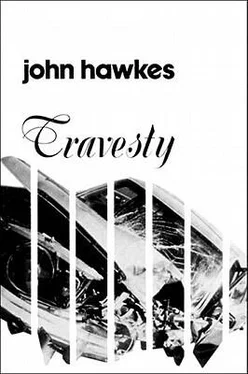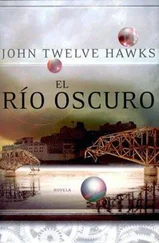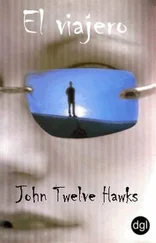I am always moving. I am forever transporting myself somewhere else. I am never exactly where I am. Tonight, for instance, we are traveling one road but also many, as if we cannot take a single step without discovering five of our own footprints already ahead of us. According to Honorine this is my other greatest failing or most dangerous quality, this propensity of mine toward total coherence, which leads me to see in one face the configurations of yet another, or to enter rose- scented rooms three at a time, or to live so closely to the edge of likenesses as to be eating the fruit, so to speak, while growing it. In this sense there is nowhere I have not been, nothing I have not already done, no person I have not known before. But then of course we have the corollary, so that everything known to me remains unknown, so that my own footfalls sound like those of a stranger, while the corridor to the lavatory off my bedroom suddenly becomes the labyrinthine way to a dungeon. For me the familiar and unfamiliar lie everywhere together, like two enormous faces back to back. I am always seeing the man in the child, the child in the grown man. Winter is my time of flowers, I am a resigned but spirited voyager. Of course the whole thing is only a kind of psychic slippage, an interesting trick of deja vu, although Honorine insists that it is a form of mystical insight. She is inclined to idealize me in her own reasonable and admirable fashion. But then I must add that at certain times she has found my mental disappearances, as she calls them, not merely disconcerting but fearful. And yet I have never given Honorine literal cause for anxiety, I can promise you that. She will be the last to propose any ready answers when she learns what has become of us tonight.
But no doubt I have been meaning to say that every more or less privileged person contains within himself the seed of the poet, so that the wife of each such individual wants nothing more than to be a poet's mistress. In this respect Honorine has been especially fortunate.
Do not be alarmed, cher ami. The matter at hand is not necessarily so very important. But we might as well spare ourselves whenever we can. The problem is that there is exactly time enough for me to forewarn you that in a few seconds we will be passing directly through the center of the only village that lies between the beginning of our trip tonight and its conclusion, and that mars an otherwise quite empty road. The little place is known for its ruined abbey, or perhaps it is a ruined mill. But believe me, please. This route was the most fortuitous I could select. I wished only for an unimpeded journey. However, the sore spot of this little village was unavoidable. At any rate, you deserve to know the worst and the best, and should be as clear as I am about our situation and hence be in a position to prepare yourself moment by moment to achieve understanding and avoid merely shocking or destructive surprises. So let me warn you that tonight we will encounter only three genuine points of danger, though unhappily the rain has become a kind of general hazard, albeit one out of your hands and of little interest to me. But back to the three genuine points of danger. The final turnoff to the abandoned farm, the Roman aqueduct, and the village we are rapidly approaching — each of these will present us with grave danger, which I will not attempt to conceal, as I have said. However, I am confident about the aqueduct while our journey itself is preparation for the final turnoff which, hopefully, by that time you will encounter as something quite beyond danger. So we may discount the final turnoff. I may even go so far right now as to guarantee you its serenity.
But to be perfectly honest, the village is something else again. It is careening toward us this very moment, only a few words or a few breaths away. Of course the little street through that village is short, hardly more than several lengths of the car or one of those sylvan paths that take you from the intersection of two dusty roads to the turnstile at the edge of the field. So it is a short village street but obstinate, and unlighted, and extremely narrow, and bordered for its entire length by a high, sinuous stone wall overtopped by the now wet tile roofs of the village houses and the limbs of an occasional dead tree. Throughout our passage through the wretched place the side of the car will be within touching distance of the heavy stone. If you insist on looking, you will see an infinite rapid shuffling of rock and wood; iron door handles and high broken shutters will fly in your face; our way shall consist of impossible angles, a near collision with the fountain in the central square, a terrible encounter with a low arch. We shall have become a locomotive in a maze, and the noise will be the worst of all. Our lights will be like searchlights swiveling in unimaginable confinement, and a forlorn, artificial rose and the granite foot of one of their crucified Christs and a sudden low chimney will all approach us like a handful of thrown stones. But the noise will be the worst. It will be as if we ourselves were a rocket firing in the caves and catacombs of history. Let us hope that the cats of the village are not as prevalent as the rabbits of our rural highway. Let us hope that we are not deflected by a shard of tile or little rusted iron key or the slick, white femur of some recently slaughtered animal. Otherwise we shall brush the stone walls, swerve, bring down the entire village to a pile of rubble which we shall no doubt drag after us a hundred meters or more.
There is nothing to be done about the sound. But you may well wish to close your eyes, or simply lean forward and bury your face in your hands. The entire deafening passage will last an eternity but also no time at all. Why see it? Why not leave the seeing as well as the driving to me? And you might amuse yourself by considering what the peasants will think when we shake their street and start them shuddering in their poor beds: that we are only an immoral man and his laughing mistress roaring through the rainy night on some devilish and frivolous escapade. Or consider what we shall leave in our wake: only an ominous trembling and a half dozen falling tiles.
But do you see it?. . Just there?. . That huddled darkness of habitation?. . The stones in the rain?. . Here it is…. Hold on
Come, come, cher ami. It is behind us. But now you know how trustworthy I really am.
Do you realize that among all the admiring readers of your slender and now somewhat rare volumes there are those who, if given even the briefest glimpse into your life and mine, would consider me a silly coward and you a worthless soul? If the invisible camera existed, and if it recorded this adventure of ours from beginning to end, and if the reel of film were salvaged and then late one night its images projected onto a tattered white screen in some movie house smelling of disinfectant and damp clothing and containing almost no audience at all, it is then that your malignant admirers would stand in those cold aisles and dismiss me as a silly coward and condemn you as a worthless soul. As if any coward could be silly, or any soul worthless. But then it is what you at least deserve, since you have spent your life sitting among small audiences in your black trousers and open white shirt and with your cigarette in your mouth and your elbows on your knees and your hands clasped-like a man on a toilet-telling those eager or hostile women that the poet is always a betrayer, a murderer, and that the writing of poetry is like a descent into death. But that was talk, mere talk. Now, if given the chance, you would speak from experience.
As for me, I have said it already and will not hesitate to say it again: I am an avowed coward. I am partial to cowards. If I am unable to detect in a stranger some hint of his weakness, some faint gesture of recognition passed back and forth between us furtively and beneath the table, or at least the briefest glimpse of his particular white flag raised in the empty field that is himself, then I am filled with hopelessness, with a sadness as close to despair as rain to hail. But who is not?
Читать дальше












